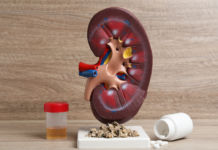For Educational Purposes Only.
Your kidney health is dependent upon the amount of fluids you drink per day. Dehydration, especially for long periods of time, results in the production of urine with high concentrations of minerals and nitrogenous waste products. If the level of concentration becomes high these minerals and toxins can crystallize which can lead to kidney stones. Kidney stones are formed when urate and oxalate concentrations in the bloodstream get so high, that they crystallize1. These crystals build up in the kidney and become stones. Once a kidney stone has formed, it will begin to pass through the urinary system.
Small stones can pass with relative ease, but the larger
stones can block the ureter and urethra,
causing severe pain. Hydrating yourself
is the best way to prevent kidney stones from happening! Drinking adequate amounts
of water can help to keep the
concentrations of oxalate and urate balanced, and well below the critical levels
that cause crystallization. The risk of
kidney stones for men is around 19% and 9% for women2.
Everyday women should drink 11.5 cups of water and men should drink 15.5 cups of water3. By drinking lots of water, your kidneys are more efficient in filtering out waste products and lowering sodium from the bloodstream. Researchers in Australia and Canada have found that by staying hydrated you lower your chances of developing Chronic Kidney Disease4. It is important to do everything in moderation, so do not go overboard and over hydrate, stick to the 11-15 cups per day, and drink more during intense physical exercise, hot climate conditions, during pregnancy/breastfeeding, and personal metabolism.
Quick tips to keep those kidneys hydrated: Kidney Health
- Water is the best choice for hydration.
- Don’t chug your water, and drink often.
- Women should aim for 11.5 cups per day.
- Men should aim for 15.5 cups per day.
- During exercise/hot conditions you may need to drink more water to balance the water leaving your body via sweat.
- The color of dehydrated person urine is dark, the lighter color is better5
- While moving around/during intense exercises keep a bottle of water on hand.
By following through with these various tips you can help keep your kidneys hydrated, and in good shape. Drinking the right amount of water each day is the easiest way to keep your kidney health balanced and reduce the risk of kidney stones and Chronic Kidney Disease.
Sponsor: Kibow Biotech® 
References
- National Kidney Foundation. (2019, April 19). Calcium Oxalate Stones. Retrieved from https://www.kidney.org/atoz/content/calcium-oxalate-stone
- National Kidney Foundation. (2017, February 13). Kidney Stones. Retrieved from https://www.kidney.org/atoz/content/kidneystones
- Mayo Clinic. (2017, September 06). Water: How much should you drink every day? Retrieved from https://www.mayoclinic.org/healthy-lifestyle/nutrition-and- healthy-eating/in-depth/water/art-20044256
- Hoon Young Choi, Hyeong Cheon Park, & Sung Kyu Ha. (2015). High Water Intake and Progression of Chronic Kidney Diseases. Electrolytes and Blood Pressure, 46-51. doi:https://dx.doi.org/10.5049/EBP.2015.13.2.46
- Dripdrop.com. (2014, October 31). CHART: Are You Dehydrated? Retrieved from https://dripdrop.com/blogs/news/chart-dehydrated




